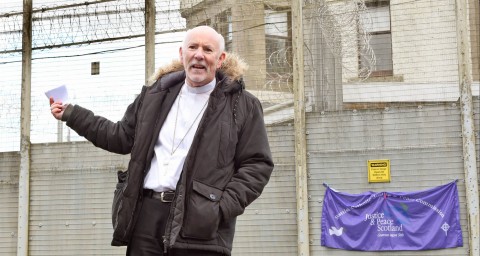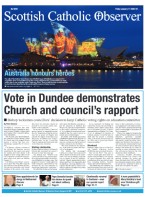BY Ryan McDougall | November 30 2018 | ![]() 0 COMMENTS
0 COMMENTS ![]() print
print

Detention centre is ‘a prison in all but name’ says Bishop
Publication Date: 2018-11-30
Dungavel blasted as Catholic shares story of persecution and agonising wait.
THE BISHOP of Galloway has this week called Dungavel House a ‘blot on the Scottish landscape’ following last weekend’s protest at the Immigration Removal Centre.
A Catholic parish co-ordinator who found asylum in the United Kingdom after fleeing Pakistan as a persecuted Christian has also said that people should remember ‘refugees face agonising fear’ and are ‘wrongly labeled as criminals.’
Last Sunday, November 25, Bishop Nolan protested at Dungavel with Justice and Peace Scotland, the Bishops’ Conference of Scotland commission of which he is president, various political figures, and representatives of Global Justice Now, Ayrshire Hope Not Hate and Friends of Refugees.
The group gathered outside the remote Lanarkshire centre where migrants and refugees are often held for extended periods of time facing an uncertain future.
Speakers contested the very existence of Dungavel House and gave different reasons for wanting it to close.
Bishop Nolan said that the protest coincided with Prisoners’ Week, and that he had recently spent time visiting two prisons in his diocese: HMP Kilmarnock and HMP Dumfries.
Referring to Dungavel House, the bishop said: “There was a time where there wasn’t any fence there and that’s when it was an open prison. Now it’s an immigration removal centre and there’s a big fence there. It’s a prison in everything else but name.”
Utter disgrace
Bishop Nolan stated that the difference between the two prisons he has visited in his diocese and Dungavel House is that those in prison know how long they are there for before being released, whereas they can be held indefinitely in Dungavel.
He described the fact that the UK government is the only European country where asylum seekers and migrants can be detained indefinitely as ‘an absolute scandal,’ lambasting it as ‘an absolute and utter disgrace.’
The bishop then commended the protesters for campaigning for the closure of the detention centre and campaigning against the ‘injustice and inhumanity’ of it, saying: “Dungavel is a blot on the Scottish landscape.”
He said: “We want a country where migrants and those who seek asylum are met with compassion and understanding.
“They shouldn’t be locked up and treated as criminals but allowed to live in the community where they can be supported while their cases are being assessed.
“Your presence here in support of those who are detained is a sign to them that they are not forgotten and that the people of this country do care.”
Currently detainees in Dungavel are unable to phone or video-call their families.
Frances Gallagher, Justice and Peace Scotland’s campaigns and communications officer, echoed Bishop Nolan’s comments on the injustice and inhumanity of Dungavel and how costly it is to the UK taxpayer.
Basic human dignity
“These draconian institutions have no place in the UK in 2018,” she said.
“They are hugely expensive, costing around £30,000 per year for each person detained. This is money that should be better spent.
“We want to see an end to immigration detention and the hostile environment currently being perpetrated by the UK government and a return to policies which uphold basic human dignity.”
The protest also fell on the first date of the 16 Days of Activism, an international campaign against violence towards women and girls.
Christina McKelvie, MSP for Hamilton, Larkhall and Stonehouse, addressed this at Dungavel.
She said: “There’ll be women in there today whose only crime was to seek that type of support [from the UK government]—protection away from that persecution.
“Today I think, at the beginning of the 16 Days of Activism, as we remember everybody who is a victim of this hostile environment, please give a wee extra thought to some of the women and girls whose only crime was to seek protection.”
A parish and youth coordinator of Motherwell Diocese and Glasgow Archdiocese this week opened up about her own experience as an asylum seeker, criticising Dungavel’s existence and the Home Office procedures which can see people deported on minute points of order.
Mishal Novani, who is working on a Doctorate of Practical Theology (DPT) at the University of Glasgow, is undertaking research studies on persecuted Christians in Pakistan, a topic she can relate to well.
“My family were persecuted Christians who fled Pakistan and found asylum in Scotland so I have great solidarity with asylum seekers, especially women and young children,” she said.
“I was 14 years old when we had to leave Pakistan and fortunately my family never ended up in Dungavel. I only know one family from Pakistan who were sent there. Sadly it is well known that it is the last place you go before being deported from the UK.
Seeking refuge
“I think people should always remember that asylum seekers are people seeking refuge. The first principle of being an asylum seeker is that you are running away from something and looking for security.
“There is an immense sense of fear but you also have hope for reaching a new, safe, place.”
Mishal added that many asylum seekers don’t have full awareness of their human rights and believes that can be exploited with the agonising waiting times like those sometimes experienced at Dungavel.
She said: “Many asylum seekers believe they are secure if they have four walls but many of the people don’t have full awareness of human rights and I think, to a certain extent, that is exploited.
“The fear of not knowing when you’re going to get thrown out of the country and sent back with an agonising wait is very hard because they don’t know the reasons why their applications have been put on hold.
“It is quite ridiculous and unfair and it’s been sold by the UK Government to the citizens that asylum seekers are criminals. The UK has so many great things going for it but something it’s not good at is sharing.”
Citizenship
The UK Government has made it increasingly difficult for migrants and refugees to gain citizenship in Britain. In 2012 a law was passed which limited legal aid payments to asylum seekers.
The same year also saw the introduction of an income requirement for British citizens seeking to sponsor settlement for their relatives: a minimum of £18,600 a year, rising to £22,400 if the relative wants to bring a child, plus £2,400 for every extra sibling.
Mishal Novani has revealed she finds some of the procedures employed by the Home Office hard to understand.
She said: “We were very blessed that we only had a year and a half of anxious waiting. First our application was rejected, then we appealed and finally the court granted us acceptance.
“However, I do find some laws within the Home Office very hard to comprehend, especially the grounds on which some applications are rejected, for such minute points such as good character. It creates a hostile environment for refugees.”
Good character
The number of rejections of applications on visas issued by the Home Office on the vague grounds of ‘good character’ had more than doubled from 2012 to 5,525 in 2016.
Mishal added: “In my studies I am always looking to understand more about how the system in the United Kingdom and Scotland acknowledges refugees and, at times, its disregard for them. It is interesting to me but it’s also a very personal story.”
A Home Office spokeswoman said: “Detention and removal are essential parts of effective immigration controls, especially in support for the removal of those with no lawful basis to stay in the UK.
“The dignity and welfare of all those in our care is of the utmost importance, and the latest HMCIP report on Dungavel observed that relationships between staff and detainees were excellent.
“We have improved processes at Dungavel to better assess the needs of adults at risk at the centre to ensure that all vulnerable cases get the care and attention they need. In addition, we are undertaking an extensive refurbishment of the facilities at Dungavel, which will be completed in the next year.”










